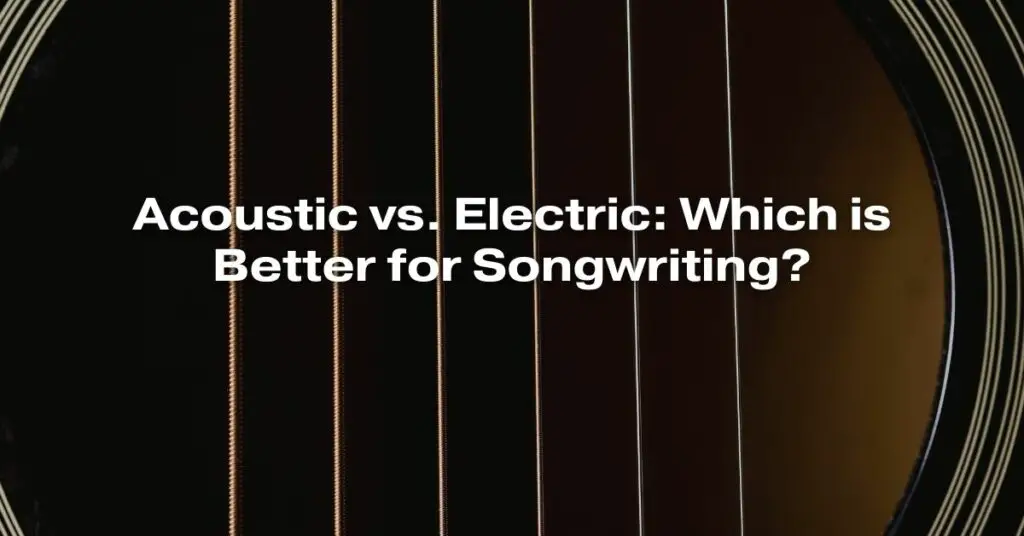When it comes to the art of songwriting, musicians are often faced with a crucial decision: should they pick up an acoustic guitar or plug in an electric one? The choice between acoustic and electric instruments significantly influences the way music is created and the emotional resonance it carries. In this exploration, we delve into the heart of this musical dilemma, aiming to uncover the unique attributes of both acoustic and electric guitars and shed light on which one might be better suited for the delicate craft of songwriting.
The Soulful Strum of Acoustic Guitars
1. Unplugged Connection:
One of the most profound aspects of acoustic guitars lies in their unplugged, raw nature. The vibrations of the strings resonate through the wooden body, creating a warm and intimate sound that forms a direct connection between the musician and the listener. This closeness often leads to deeply personal and heartfelt songwriting.
2. Songwriting Simplicity:
Acoustic guitars are inherently simple. There are no knobs to tweak or amplifiers to adjust; it’s just the musician, the strings, and the melodies. This simplicity can often lead to more focused songwriting, as artists rely solely on their skills and emotions to convey their message without the distractions of various effects.
3. Versatility of Emotion:
The acoustic guitar’s ability to convey a wide range of emotions—from the melancholic strums of a ballad to the upbeat rhythms of a folk tune—is unparalleled. The instrument’s versatility makes it a favorite among singer-songwriters looking to create evocative, storytelling music.
The Electrifying Energy of Electric Guitars
1. Sonic Experimentation:
Electric guitars open up a world of sonic possibilities. With the aid of amplifiers and effects pedals, musicians can experiment with various tones, textures, and sounds, allowing for a broader spectrum of creativity. This experimentation often leads to innovative and genre-defying compositions.
2. Dynamic Expression:
Electric guitars offer a dynamic range of expression, from gentle whispers to roaring screams. The ability to control volume and tone through the guitar and amplifier enables songwriters to create powerful climaxes and delicate moments within their compositions, enhancing the overall emotional impact of the music.
3. Collaborative Potential:
In a band setting, electric guitars find their true essence. They seamlessly blend with other electric instruments, such as bass and drums, providing the backbone for intricate arrangements. The collaborative potential of electric guitars allows songwriters to craft complex compositions, exploring diverse genres and styles.
The Decision: Which One is Better for Songwriting?
In the end, the choice between acoustic and electric guitars for songwriting is deeply personal and depends on the individual artist’s style, preferences, and intentions.
1. Choose Acoustic If:
You prefer a raw, intimate connection with your audience.
Your songwriting revolves around lyrical depth and emotional storytelling.
Simplicity and minimalism inspire your creative process.
2. Choose Electric If:
You enjoy experimenting with a variety of tones and effects.
Your songwriting incorporates complex arrangements and dynamic shifts.
You thrive in collaborative musical environments, such as bands or ensembles.
Ultimately, the best approach might be a hybrid one, where songwriters embrace both acoustic and electric guitars depending on the specific song or mood they wish to convey. Many successful artists, from Bob Dylan to Jimi Hendrix, have seamlessly integrated both instruments into their repertoire, underscoring the idea that there is no definitive answer. Instead, the magic of songwriting lies in the ability to choose the instrument that resonates most profoundly with the emotions the artist seeks to express.
In conclusion, whether it’s the soulful strum of an acoustic guitar or the electrifying energy of an electric guitar, both instruments offer unique avenues for creative expression. The key lies in understanding their individual strengths and choosing the one that aligns with the artist’s artistic vision. After all, in the realm of songwriting, the heart and soul of the musician will always be the true driving force, regardless of whether they choose the acoustic path or the electric avenue.

